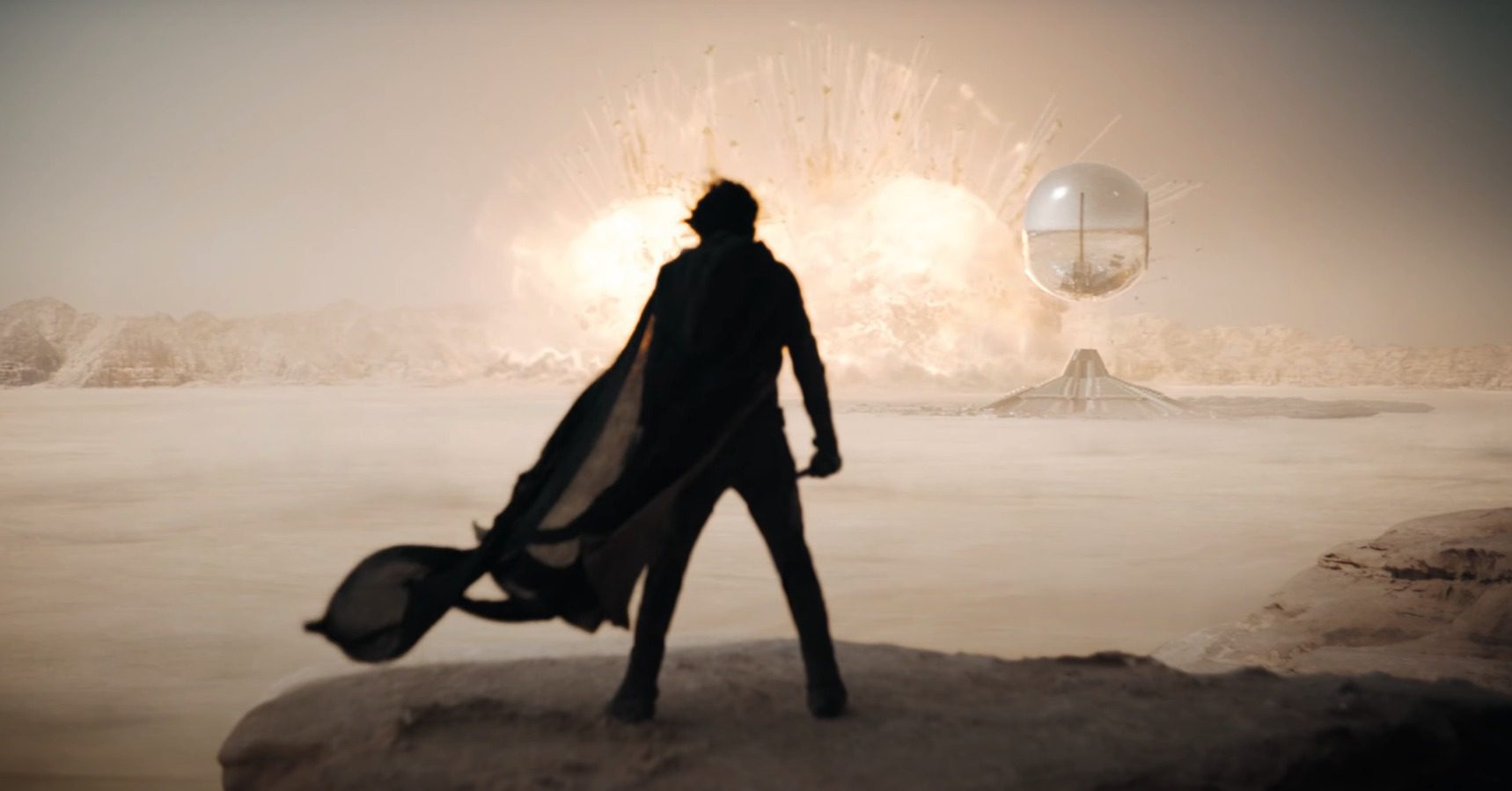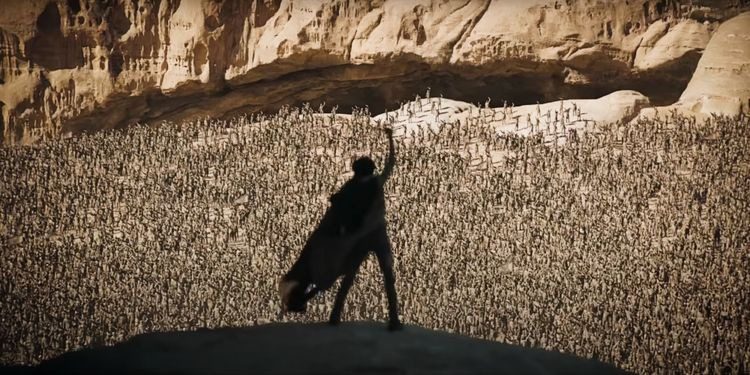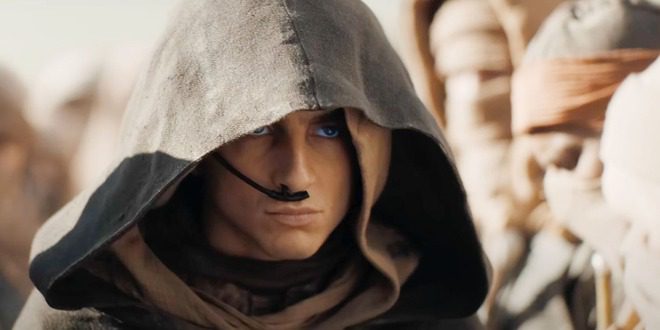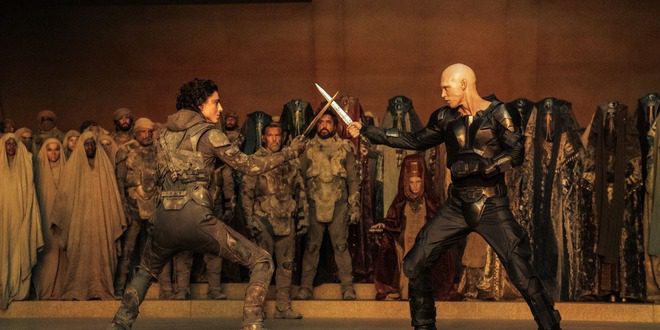Dune: Part Two is one of the most anticipated blockbusters of 2024, currently making waves in theaters worldwide. This film brings a grand conclusion to the adaptation of the first book in the renowned series by author Frank Herbert, while simultaneously setting the stage for future installments directed by Denis Villeneuve.
Picking up immediately after the events of Dune (2021), Dune: Part Two focuses on the journey of Paul Atreides (Timothée Chalamet) as he seeks to unite with the Fremen and navigate the internal conflicts surrounding the prophecy of Lisan al-Gaib. The film also delves deeply into the romantic relationship between Paul and Chani (Zendaya) as they become embroiled in the war against House Harkonnen over control of the planet Arrakis. This narrative becomes even more intricate as Lady Jessica (Rebecca Ferguson) instills the belief that her son is indeed the prophesied leader of the Fremen.

Dune 2 is making waves in theaters worldwide – Image: Internet.
The climax of Dune: Part Two centers on the significant challenges that Paul must face in order to become the new Emperor. This culminates in an epic confrontation with House Harkonnen, leading to the demise of the villainous Baron Vladimir Harkonnen (Stellan Skarsgård) and the intense battle with his nephew, Feyd-Rautha Harkonnen (Austin Butler), for control of the throne. All these events are intricately tied to Paul’s visions of his own future. This theme contributes to the film’s poignant exploration of the burdens of power, while also providing a setup for the adaptation of Dune: Messiah in the future.
Paul’s Ascendancy and the Liberation of Arrakis

Paul Atreides has become the “prophesied leader” of the Fremen in Dune 2 – Image: Internet.
The main theme of the finale revolves around Paul Atreides accepting his fate as the Lisan al-Gaib of the Fremen, leading to his ascension as Emperor of the known universe. In the latter part of the film, Paul continually wrestles with his inner turmoil, battling against the prophetic visions that foreshadow bloodshed should he accept this role. His journey is further complicated by the faith bestowed upon him by Stilgar (Javier Bardem) and the resolve of Jessica in utilizing the prophecy within Fremen culture.
Despite not being entirely comfortable with the idea of drinking the Water of Life and becoming Lisan al-Gaib, Paul feels compelled to pursue power, especially after Feyd-Rautha devastates the northern Fremen territories. Paul’s plan involves consolidating the power of the Bene Gesserit by consuming the Water of Life, thereby gaining the support of the Fremen populace, creating a formidable military force on Arrakis, combined with the Atreides’ spice reserves, to combat the Harkonnens.
This newfound strength enables Paul to confront Emperor Shaddam IV (Christopher Walken) and execute a two-pronged strategy. The first step involves marrying Princess Irulan (Florence Pugh), the daughter of Shaddam IV, to solidify the Corrino bloodline’s power. The second step is to challenge Feyd-Rautha, the heir to House Harkonnen, as he aims to disrupt the Harkonnen’s control, simultaneously positioning himself as a potential replacement for Shaddam, even if the noble houses do not acknowledge the outcome.
Through these actions, Paul rises to a new level of power. He liberates Arrakis from Harkonnen’s oppressive rule by claiming the throne for himself while simultaneously consolidating power for House Atreides and avenging his father’s death. Paul becomes the rightful ruler of Arrakis, embodying the Fremen’s prophecy as Lisan al-Gaib, and solidifying his position as Emperor of the universe. This transformation also manifests the visions Paul has witnessed throughout Dune: Part Two regarding his rise to power, which is supported by a massive religious crusade and a widespread war that leads to the deaths of many.
The Holy War Among the Noble Houses

Paul’s ascension has sparked a massive war – Image: Internet.
One of the final moments in Dune: Part Two is Jessica’s declaration about the “Holy War” that has begun. This moment is significant as Paul’s army starts to unify to fight against the noble houses. He orders Stilgar, Gurney (Josh Brolin), and others to wage war in his name after hearing that the noble houses still refuse to recognize Paul’s claim to the throne. Paul’s use of his entire military force marks the beginning of a large-scale war that aims to bring honor and respect back to him.
The Holy War portrayed in Dune: Part Two realizes a vision that Paul had in the first film, where he envisioned a “holy war sweeping across the universe like an unstoppable fire.” This is the culmination of the belief that the Fremen hold in Paul as the Lisan al-Gaib, transforming him into a religious figure who will not cease fighting until the prophetic fulfillment of his destiny is widely accepted. This movement is poised to challenge the ruling class, as many nobles may face execution for opposing Paul’s reign or for refusing to accept the religious tenets of the Fremen.
Why Does Chani Leave Paul?

Chani’s departure represents a major shift from the original narrative – Image: Internet.
One of the major deviations in Dune: Part Two is Chani’s storyline. Throughout most of the film, Chani expresses doubts about the prophecy surrounding Lisan al-Gaib, even as she falls deeply in love with Paul. Chani ultimately leaves after Paul ascends to the throne and marries Irulan, despite him declaring that he will always love her. This painful betrayal and Paul’s new authoritarian rule contradict everything Chani hoped for.
In the finale of Dune: Part Two, Chani rides off on a sandworm, signaling her departure from a life entwined with Paul. This change starkly contrasts with the original narrative, making it difficult to find a clear answer as to why Chani has chosen to distance herself from Paul. It could be that Chani decided to step away from Paul to explore the universe independently rather than being under his control. This could pave the way for significant changes in the storyline for Dune: Messiah (Dune 3), should Warner Bros. give the green light for this project.
Dune 2 Transforms Paul Atreides into a Tragic Hero

The tragic essence of Dune is vividly illustrated through Paul’s journey to power – Image: Internet.
Dune: Part Two revolves around Paul’s transformation into Lisan al-Gaib, and through this lens, the film vividly portrays the tragic essence of the main character’s journey to power. From the onset, the narrative underscores Paul’s disbelief in being the prophesied leader of the Fremen, and he himself does not wish to embrace this role. Everything Paul says and does serves to counteract the notion that following the Fremen will transform him into a heroic figure, initiating a large-scale Holy War.
As a result, Paul’s acceptance of becoming Lisan al-Gaib becomes all the more tragic. He must confront the reality that he cannot prevent this ultimate outcome, forcing him into a role he despises while beginning a campaign that leads to countless deaths. It is Paul who ultimately ascends to power, cementing both his destiny and the impact he has on the universe, yet Dune: Part Two delicately illustrates that this is not his true desire.
One of the significant aspects that makes Dune: Part Two a poignant tragic narrative is the relationship dynamics between Paul and Chani. Paul often struggles to articulate his love for her, hoping that she will understand the decisions he must make to protect her, the Fremen, and Arrakis itself. Chani’s departure at the film’s conclusion serves as a stark reminder of the price Paul must pay to become the ruler he was destined to be. This element has allowed Dune: Part Two to effectively convey the internal conflicts that arise within Paul Atreides’ character.
The conclusion of Dune: Part Two conveys the film’s intended message, resonating with the vision of author Frank Herbert. It encapsulates the dangers of power, vividly depicted through Paul’s transient ascendancy in the universe. The peril of power is not only exemplified throughout the strong narrative of Paul but also through its implications on the environment around him. Dune: Part Two ends with Paul liberating a group of Fremen, yet simultaneously brings a heavy burden upon many other groups.
What Lies Ahead for Dune 3?

Many questions remain unanswered after Dune 2 concludes – Image: Internet.
Dune: Part Two concludes the first novel of Herbert’s series, while also laying the groundwork for future projects. Dune 3, if produced, could potentially adapt the second novel, Dune: Messiah, set twelve years after Paul becomes Emperor of the universe. The Holy War may not necessarily be the central focus of this sequel, but it will serve as a backdrop for other power struggles that will take place during Paul’s reign.
The political marriage between Paul and Irulan will also be a significant focal point for Dune 3. This is clearly just a political arrangement, devoid of genuine affection, as Paul remains devoted to Chani. Chani’s fate raises questions about how Dune 3 will explore this storyline moving forward. It will also present a challenging puzzle for Villeneuve to adapt Dune: Messiah in a way that resonates with the original narrative.
Lastly, we cannot overlook the character of Alia Atreides (Anya Taylor-Joy), Paul’s sister. The casting of a rising star for this role indicates that Alia may play a more significant role in the future of the Dune universe, potentially bringing about considerable changes to Paul’s reign and the overarching narrative of the universe itself. The introduction of Alia into the storyline suggests a future dynamic that could differentiate the plot significantly in the next film.
Source: ScreenRant




















